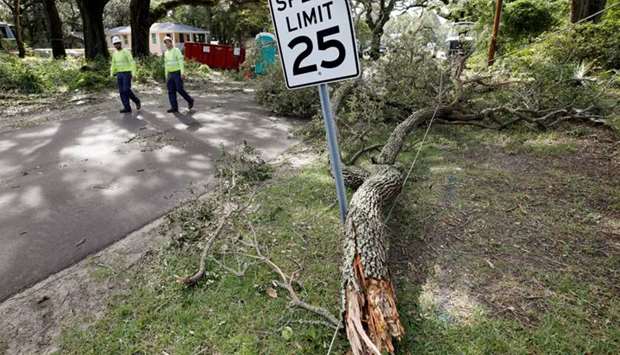Hurricane Dorian made landfall on the Outer Banks of North Carolina on Friday, hitting the beach resort area with powerful winds and battering waves days after reducing parts of the Bahamas to rubble.
The storm made landfall at Cape Hatteras at about 9 a.m. (1300 GMT) with maximum sustained winds of 150 km per hour, weaker than its slow, deadly tour through the Bahamas earlier in the week, according to the National Hurricane Center.Ellen and Jon Hildebrand, both 59, had left behind their beach-adjacent home to ride out the storm at an inland hotel in Elizabeth City with their daughter, a college student. They had only moved to the Outer Banks two years ago, making Dorian their first hurricane as homeowners there.
"That's the thing that's the most nerve-racking, it's so fluid," Ellen Hildebrand said. "It keeps changing; we didn't know when to leave."
Dorian lashed the Outer Banks with hurricane-force winds as far as 45 miles (72 km) from the eye of the storm and sent tropical storm winds farther than 200 miles (320 km) from its center, the hurricane center said.
It has already dumped up to 10 inches (25 cm) of rain along the Carolinas coastline, forecasters said. It could cause storm surges as high as 7 feet (2 meters) in North Carolina.
Dorian is expected to push out north to sea later on Friday and bring tropical storm winds to Nantucket Island and Martha's Vineyard, Massachusetts, early on Saturday.
But it will likely spare much of the rest of the East Coast the worst of its rain and wind before making landfall in Canada's Nova Scotia that night, the hurricane center said.
The howling west flank of Dorian has soaked the Carolinas since early Thursday, flooding coastal towns, whipping up more than a dozen tornadoes and cutting power to hundreds of thousands of people.
More than 330,000 homes and businesses were without power in North Carolina and South Carolina on Friday morning.
But as Dorian is expected to pick up speed from its 14 mph (22 kph) crawl on Friday, life-threatening storm surges and dangerous winds remain a threat for much of the area, the National Hurricane Center said.
Governors in the region declared states of emergency, shut schools, opened shelters, readied National Guard troops and urged residents to heed warnings, as news media circulated fresh images of the storm's devastation in the Bahamas.
At least 70,000 Bahamians needed immediate humanitarian relief after Dorian became the most damaging storm ever to hit the island nation.
In the Carolinas alone, more than 900,000 people had been ordered to evacuate their homes. It was unclear how many did so.
Dorian whipped up at least three tornadoes in the region, officials said.
Of at least four storm-related deaths reported in the United States, three were in Orange County, Florida, during storm preparations or evacuation, the mayor's office said. In North Carolina, an 85-year-old man fell off a ladder while barricading his home for Dorian, the governor said.

